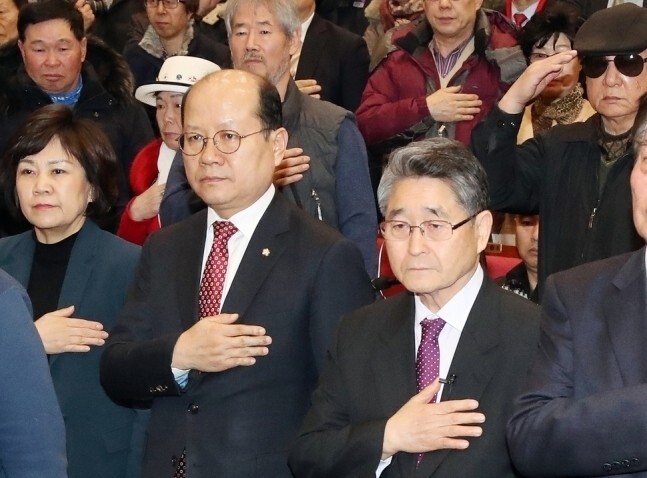hankyoreh
Links to other country sites 다른 나라 사이트 링크
Conservative commentator sentenced to 2 years for defamation regarding Gwangju Democratization Movement

Conservative commentator Jee Man-won, 79, was sentenced to two years in prison in a trial over remarks claiming that the May 18 Democratization Movement in 1980 was carried out by North Korean special forces. Jee was initially indicted on defamation charges in 2016, but the first ruling took four years to emerge amid delays due to case merging and other factors.
On Feb. 13, Judge Hon. Kim Tae-ho of the 11th criminal division of Seoul Central District Court delivered a sentence of two years in prison and a fine of 1 million won (US$844.98) against Jee, who had been indicted on charges of defamation in violation of the Act on Promotion of Information and Communications Network Utilization and Data Protection, etc. Jee was not taken into court custody in reflection of factors including his advanced age and good-faith efforts to appear in court.
“The defendant committed another offense despite a history of being punished several times for defamation-related offenses,” Kim said. “In view of the large number of offenses and the substantial psychological suffering this appears to have caused several of the victims, stern punishment is unavoidable.”
Specifically, Kim concluded that Jee had committed defamation by posting messages to an internet website claiming that Gwangju citizens shown in photographs of the May 18 Democratization Movement were “gwangsu,” or “North Korean special forces in Gwangju,” and had the same faces as North Korean senior officials.
“The very actions of the individuals in the photographs have acquired a historic aspect explicitly showing the May 18 movement, and the victims themselves have said that they are the ones in the picture,” Kim noted.
“The defendant has claimed that the faces of individuals in the photograph substantially match those of North Korean senior military figures, but has not presented any evidence to support this,” he added.
“It is recognized that [Jee’s claims] had the aim not of determining the historical truth of the May 18 Democratization Movement, but of disparaging and maligning its historical significance and value,” he said.
Kim also concluded that Jee’s actions in referring to the late Kim Sa-bok -- a real-life figure who appears in the film “A Taxi Driver” -- as a “spy” and “Red” and posting that he had “absconded forever” constituted defamation of the deceased.
“Kim [Sa-bok] and the German foreign press journalist Juergen Hinzpeter may be seen as participating in the democratization movement for the decisive role they played in sharing the truth of May 18 with the rest of the world,” the judge said. “The claim that he ‘absconded’ to conceal his status as a spy is judged to be a falsehood.”
Jee also faced accusations over remarks referring to the Gwangju Catholic diocese’s justice and peace committee as “communists disguised as priests” and alleging that “When That Day in May Comes Again,” a photography collection published by the committee, was produced by its priests in collusion with North Korea. Judge Hon. Kim Tae-ho ruled that the “basis [for Jee’s claims] is feeble and the means of expression malicious,” presenting the “risk of tarnishing social reputation and dignity in connection with the victims’ publishing of a photography collection.”
Jee’s trial had stretched out to four years following his indictment in April 2016 on defamation charges related to the events in Gwangju in 1980. Jee had been indicted successively by prosecutors in connection with three defamation cases presented in 2015, with the cases subsequently merged into a single trial and new indictments added as late as December of last year. While the trial has been taking place, Jee’s outrageous remarks have continued to spread among far-right politicians, resulting in ongoing damage.
By Jang Ye-ji, staff reporter
Please direct comments or questions to [english@hani.co.kr]

Editorial・opinion
![[Column] Season 2 of special prosecutor probe may be coming to Korea soon [Column] Season 2 of special prosecutor probe may be coming to Korea soon](https://flexible.img.hani.co.kr/flexible/normal/500/300/imgdb/original/2024/0426/3317141030699447.jpg) [Column] Season 2 of special prosecutor probe may be coming to Korea soon
[Column] Season 2 of special prosecutor probe may be coming to Korea soon![[Column] Park Geun-hye déjà vu in Yoon Suk-yeol [Column] Park Geun-hye déjà vu in Yoon Suk-yeol](https://flexible.img.hani.co.kr/flexible/normal/500/300/imgdb/original/2024/0424/651713945113788.jpg) [Column] Park Geun-hye déjà vu in Yoon Suk-yeol
[Column] Park Geun-hye déjà vu in Yoon Suk-yeol- [Editorial] New weight of N. Korea’s nuclear threats makes dialogue all the more urgent
- [Guest essay] The real reason Korea’s new right wants to dub Rhee a founding father
- [Column] ‘Choson’: Is it time we start referring to N. Korea in its own terms?
- [Editorial] Japan’s rewriting of history with Korea has gone too far
- [Column] The president’s questionable capacity for dialogue
- [Column] Are chaebol firms just pizza pies for families to divvy up as they please?
- [Column] Has Korea, too, crossed the Rubicon on China?
- [Correspondent’s column] In Japan’s alliance with US, echoes of its past alliances with UK
Most viewed articles
- 1AI is catching up with humans at a ‘shocking’ rate
- 2After election rout, Yoon’s left with 3 choices for dealing with the opposition
- 3[Column] Season 2 of special prosecutor probe may be coming to Korea soon
- 4No good, very bad game for Korea puts it out of Olympics for first time since 1988
- 5Korea’s 1.3% growth in Q1 signals ‘textbook’ return to growth, says government
- 6Is Japan about to snatch control of Line messenger from Korea’s Naver?
- 7[Column] Park Geun-hye déjà vu in Yoon Suk-yeol
- 8Division commander ordered troops to enter raging flood waters before Marine died, survivor says
- 9Marriages nosedived 40% over last 10 years in Korea, a factor in low birth rate
- 10‘We must say no’: Seoul defense chief on Korean, USFK involvement in hypothetical Taiwan crisis